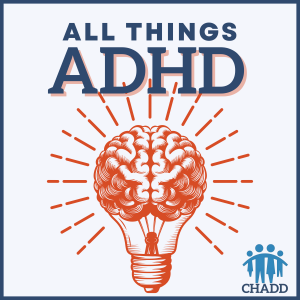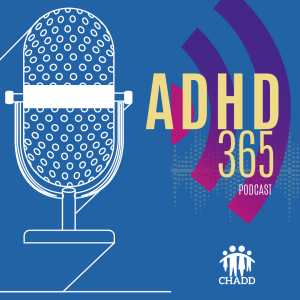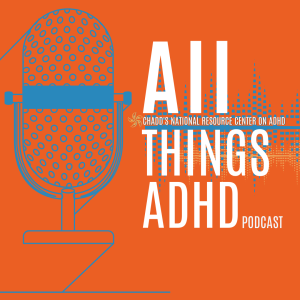Episodes

Wednesday Sep 28, 2022
Fathering with ADHD (All Things ADHD)
Wednesday Sep 28, 2022
Wednesday Sep 28, 2022
ADHD can influence emotional regulation skills, organizational skills, and one’s ability to make and maintain social connections. These symptoms can create a negative impact when they interfere with a father’s ability to manage his own life and his children’s lives. In this episode, Carey Heller, PsyD, discusses the best interventions for men with ADHD, tips for how to overcome common challenges that arise when you have ADHD and are raising children, what to look for in an ADHD support practitioner, and shares helpful resources for fathers with ADHD.

Friday Sep 09, 2022
Help Your Child with ADHD Manage Homework Autonomously (ADHD 365)
Friday Sep 09, 2022
Friday Sep 09, 2022
Your child constantly loses homework, misses deadlines, and procrastinates about starting assignments until the last minute. Why is this happening and what can you do to help them develop the skills they need to stay motivated, organized, and on top of assignments? Executive function skills are at the root of it all, and they take time to learn and master. In this episode, Ann Dolin, MEd, shares strategies and tips that caregivers and parents can use to assist their middle schooler or high schooler in learning to manage homework autonomously this school year.

Friday Jun 24, 2022
Summertime Strategies to Address Your Child’s ADHD at Home
Friday Jun 24, 2022
Friday Jun 24, 2022
Parenting any child comes with rewards and challenges, especially when your child has ADHD. However, if the symptoms of ADHD—disorganization, emotional irregularity, difficulty staying on task—go unmanaged, they cause disruption to family life, creating stress and anxiety for everyone. In this episode, Dr. Carey Heller talks about behavioral strategies that can help you manage a child’s ADHD at home, especially during the summer break.

Tuesday Jun 07, 2022
Navigating College with ADHD, Preparing for Success
Tuesday Jun 07, 2022
Tuesday Jun 07, 2022
For students with ADHD, the transition from high school to college is a time for them to show their independence and not rely much on their parents' support. But college is dramatically different than high school. With increased academic demands, differences in teaching methods and grading procedures, and fewer available accommodations and supports, many students with ADHD soon find themselves falling behind. Judy Bass, a Certified Educational Planner, talks about the learning supports and interventions that help students who learn differently to succeed in college.

Monday Jun 06, 2022
Help Your Teen with ADHD Prepare for and Navigate College
Monday Jun 06, 2022
Monday Jun 06, 2022
College isn't for every student graduating from high school. How do you know if college is the right choice for your teen with ADHD? Judy Bass, a Certified Educational Planner, talks about the career options for students with ADHD after high school, how to evaluate colleges to find the right fit, college application requirements, and how to help teens develop self-advocacy skills.

Sunday Jun 05, 2022
How to Help Your Child Overcome Executive Function Challenges
Sunday Jun 05, 2022
Sunday Jun 05, 2022
Executive functions: we all have and need them to manage everyday living. But many children with ADHD have executive function deficits and need help to learn how to manage their time better, stay organized, and be motivated. There are strategies and interventions that you as a parent can teach your child to help them improve in those challenging areas. In this episode, Dr. Carey Heller talks about time management, organizational, and study skills from a psychological perspective, providing insights on executive function coaching and strategies to help children thrive.

Wednesday Mar 16, 2022
Will ADHD Symptoms Improve with Marijuana Use? (All Things ADHD)
Wednesday Mar 16, 2022
Wednesday Mar 16, 2022
People report that marijuana use helps improve their ADHD symptoms. But does it really help? Or does it mask a person’s ability to care about their problems rather than work to solve them? What are the benefits and downsides to using marijuana if you have ADHD? CHADD's resident expert Dr. Gene Arnold and guest Dr. Maggie Sibley discuss the research on the therapeutic role of marijuana, the potential downside of using unregulated drugs to help with ADHD symptoms, and why more research is needed.

Monday Feb 14, 2022
ADHD and the “Just Right” Relationship ( ADHD 365)
Monday Feb 14, 2022
Monday Feb 14, 2022
The symptoms of ADHD can have profound effects on intimate relationships such as dating and marriage. But even though ADHD is present, it doesn’t mean that the person with ADHD is the sole cause of problems. Transforming your relationship starts with both partners understanding the role that ADHD plays and nondefensive listening. Melissa Orlov, the founder of ADHD Marriage, provides tools to help couples create a responsive relationship that feels “just right” for both individuals.
Melissa Orlov is the founder of ADHDmarriage.com and the author of two award-winning books on the impact of ADHD in relationships: The ADHD Effect on Marriage (2010) and The Couple's Guide to Thriving with ADHD (2014). She is considered one of the foremost authorities on the topic of how ADHD impacts adult relationships. As a marriage consultant, she helps ADHD-affected couples from around the world rebalance their relationships and learn to thrive through her seminars, consulting practice, and books. She also teaches marriage counselors and other professionals about effective marriage therapy for couples affected by ADHD. Orlov blogs for psychologytoday.com and adhdmarriage.com, where she also hosts a large community of adults learning about ADHD in relationships. She has been interviewed by many publications and media outlets, including the New York Times, CNN, Today, and US News and World Report.

Monday Feb 07, 2022
ADHD and the Increasing Suicide Rate Among Black Youth (All Things ADHD)
Monday Feb 07, 2022
Monday Feb 07, 2022
Please let us know what you think of this podcast by taking a short, anonymous survey. We value your feedback and will use it to create podcasts that are helpful to you.
Historically, suicide rates have been higher among whites than any other racial group. Recent studies confirm this but show the growing rate among Black youth, which now surpasses that of their white counterparts. Despite making up 15% of the population, Black youth make up 37% of youth suicides. The highest demographic is young Black males. The assumption would be that depression significantly contributes to the increase in suicides. However, new studies indicate that much of the increase correlates to ADHD and untreated learning disabilities. While recent trends show the growing number of suicides in Black youth and adolescents, even more alarming is the rate of suicide among very young Black children. In this episode, Dr. Napoleon Higgins shares insights about how ADHD may be contributing to the increased number of suicides in Black youth and identifies why this is happening now. He also gives recommendations for educators and healthcare providers about cultural sensitivity and offers expert advice for parents of children with ADHD on diagnosing, treatment, and suicide prevention.
Dr. Napoleon Higgins is a child, adolescent, and adult psychiatrist in Houston, Texas. He is the owner of Bay Pointe Behavioral Health Services and South East Houston Research Group.
Dr. Higgins received his MD from Meharry Medical College in Nashville, Tennessee. He completed his residency in Adult Psychiatry and his fellowship in Child and Adolescent Psychiatry at the University of Texas Medical Branch Galveston. He is the President of the Black Psychiatrists of Greater Houston, Past President of the Caucus of Black Psychiatrists of the American Psychiatric Association, and Past President of the Black Psychiatrists of America, Inc.
Dr. Higgins is co-author of How Amari Learned to Love School Again: A Story about ADHD, Mind Matters: A Resource Guide to Psychiatry for Black Communities and author of Transition 2 Practice: 21 Things Every Doctor Must Know In Contract Negotiations and the Job Search. He also specializes in nutrition and health to improve patients’ lives mentally and physically. He emphasizes that good mental and physical health are key in the practice of psychiatry and medicine.
Dr. Higgins has worked with and founded many programs that help direct inner-city young men and women to aspire to go to college and finish their educational goals. He has worked with countless community mentoring programs and has a special interest in trauma, racism, and inner-city issues and how they affect minority and disadvantaged children and communities.

Tuesday Feb 01, 2022
Tuesday Feb 01, 2022
Please let us know what you think of this podcast by taking a short, anonymous survey. We value your feedback and will use it to create podcasts that are helpful to you.
The national obesity rate continues to climb, and the minority communities in the US are being hit the hardest. Black women and Hispanic men and women all have obesity rates that are higher than the national average. Having ADHD increases the odds of developing dysregulated eating, leading to issues with body weight. Why does having ADHD increase the odds of developing dysregulated eating? Providing insight into the matter is psychologist Roberto Olivardia. He will discuss the challenges and explain why Black Americans are at greater risk of developing the coexisting conditions that result from obesity. Dr. Olivardia stresses the importance of a proper ADHD diagnosis from culturally knowledgeable healthcare providers, while also spotlighting the barriers encountered by Black individuals to receiving good healthcare and management and treatment options.



